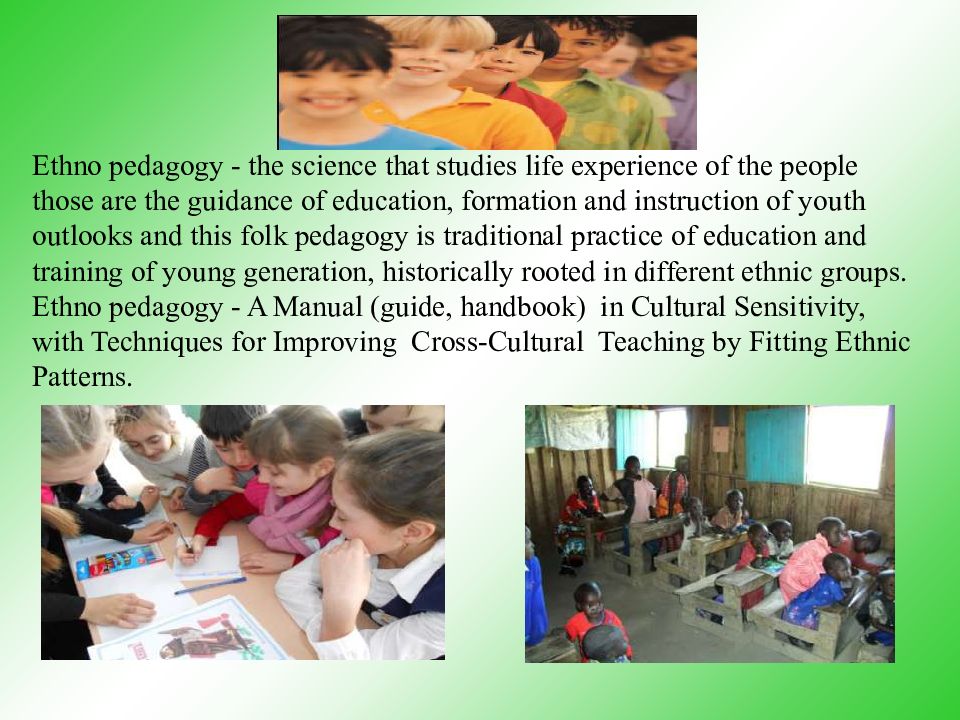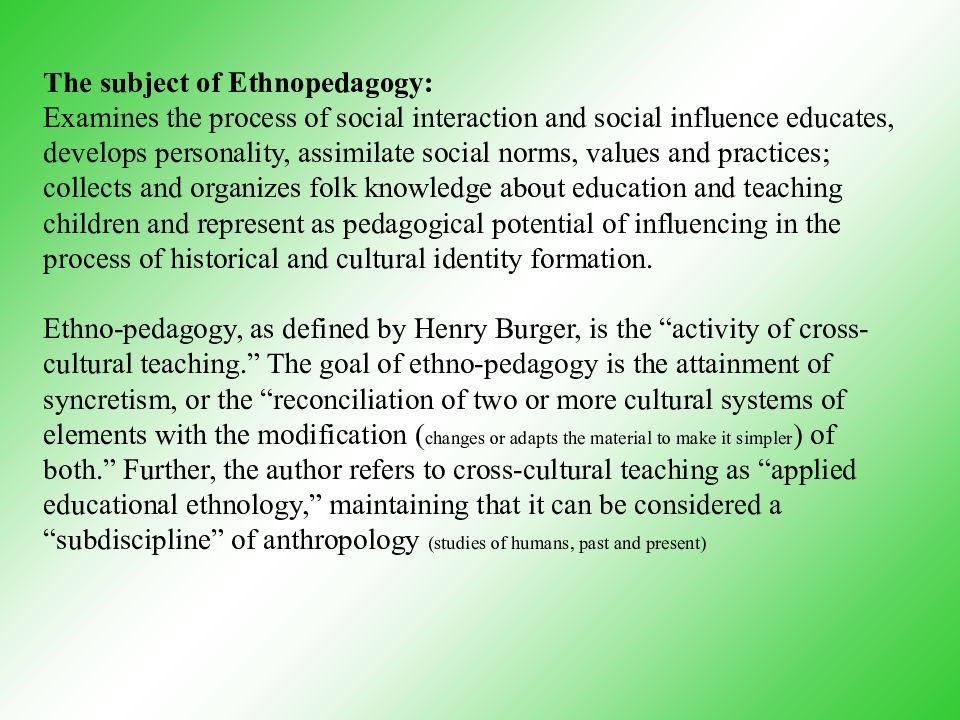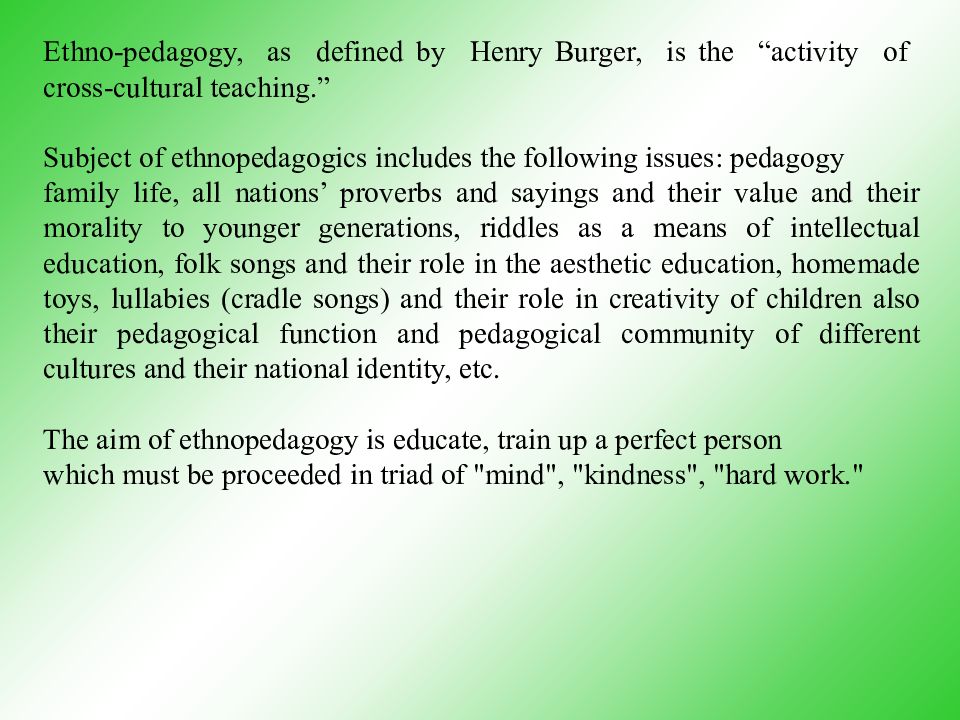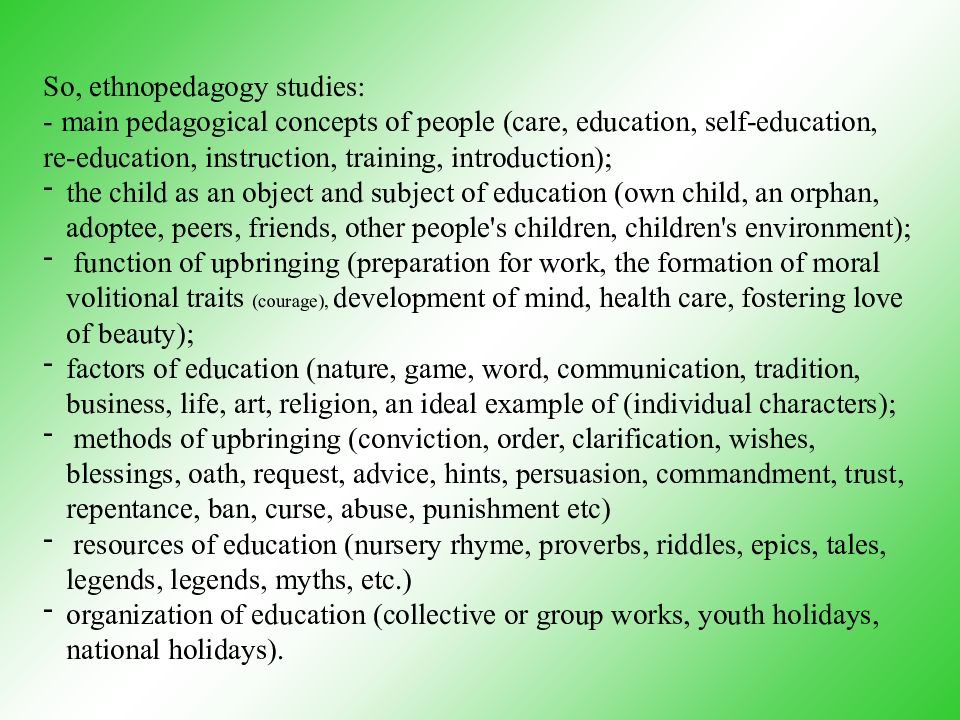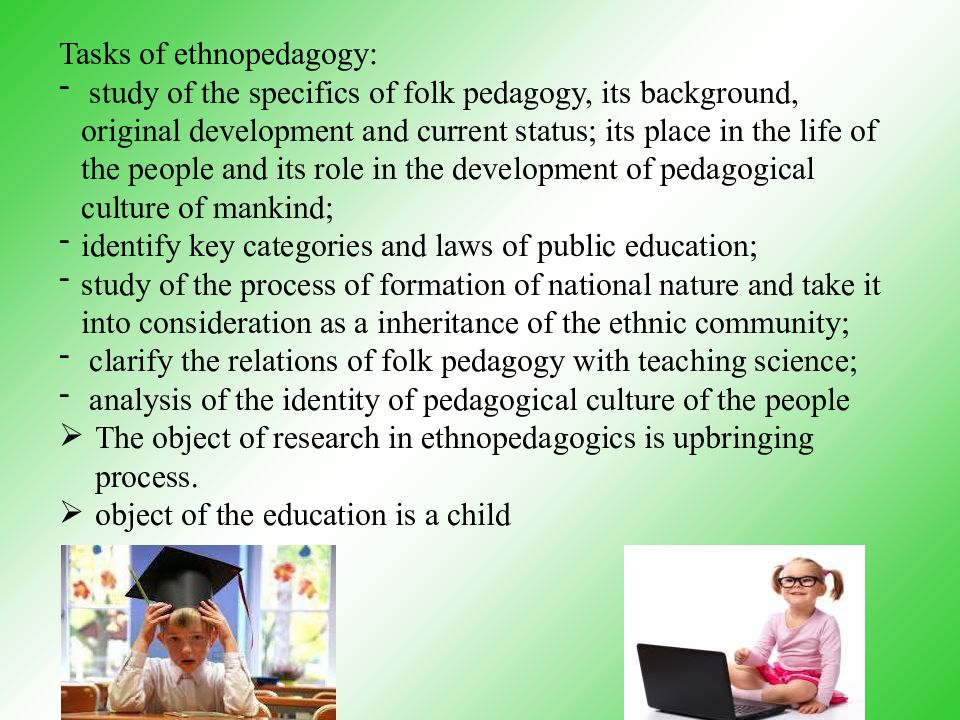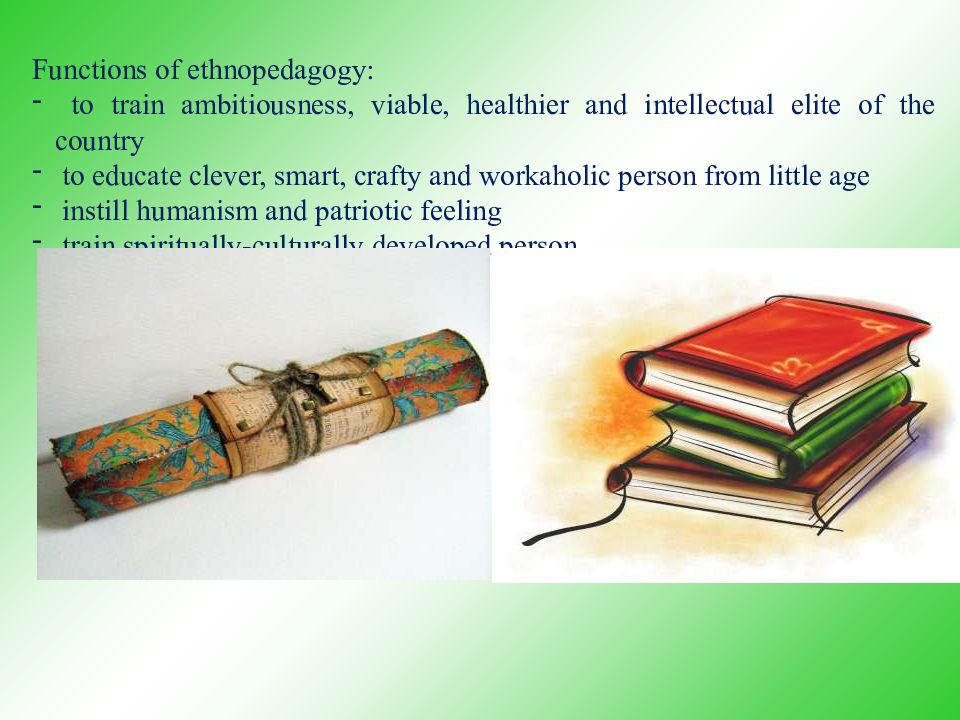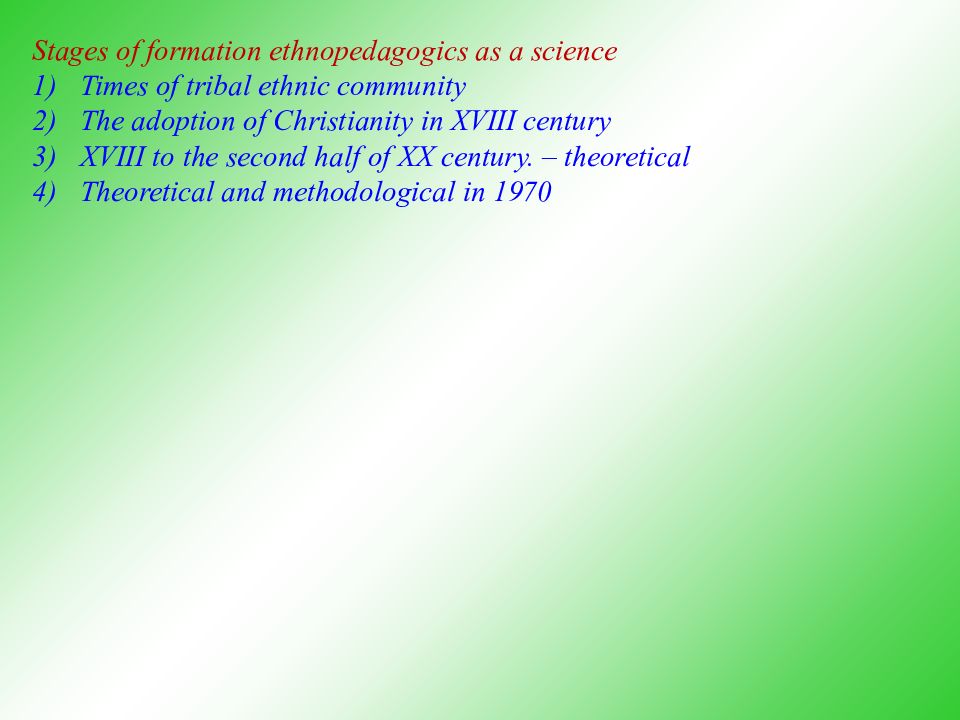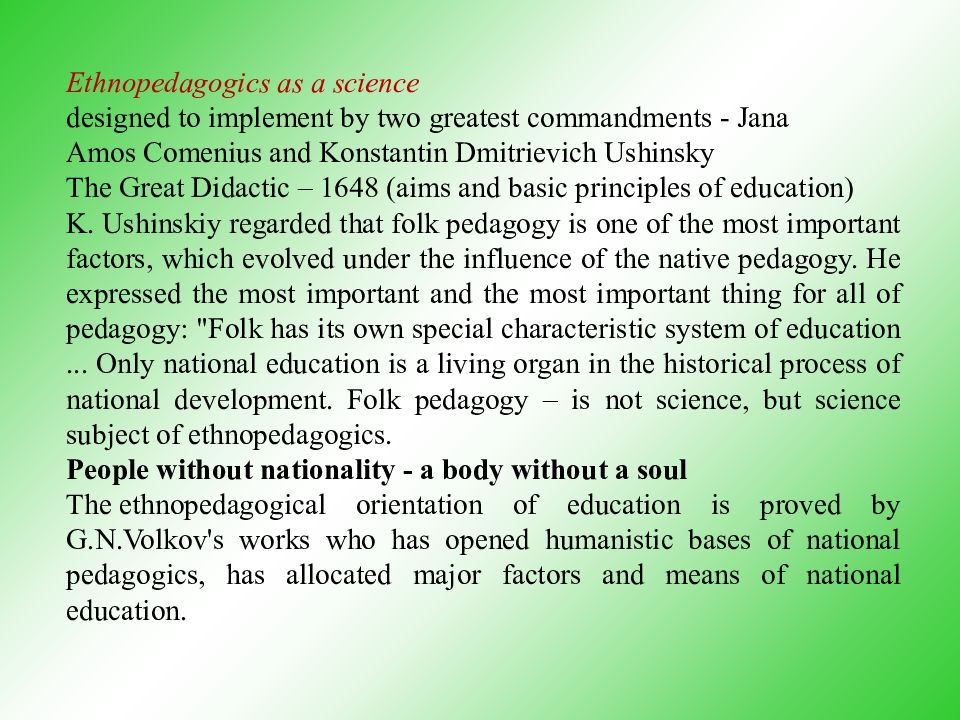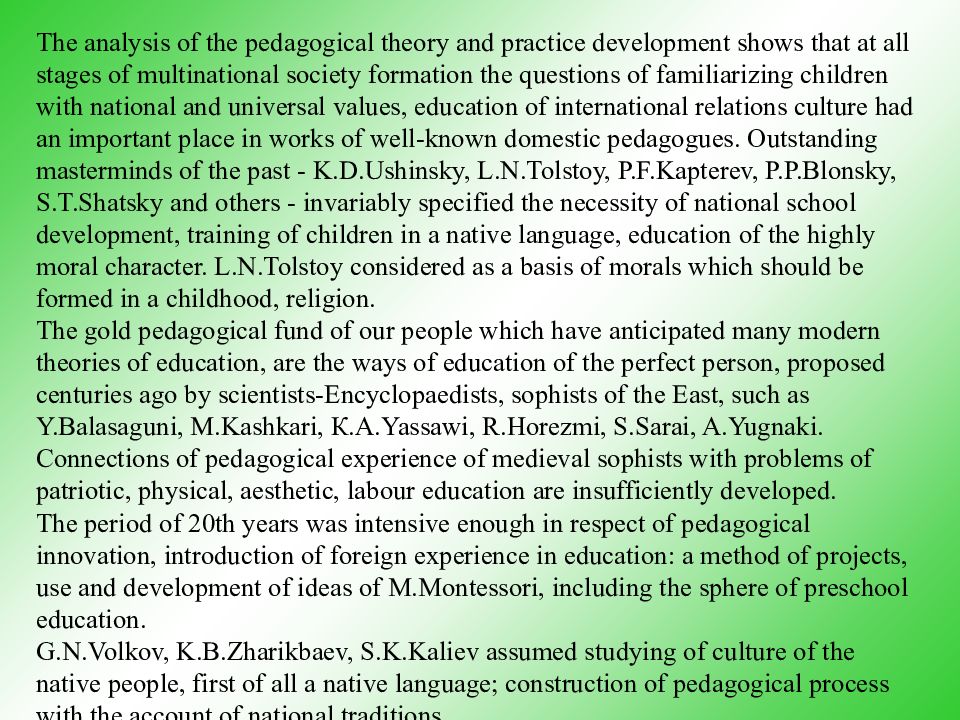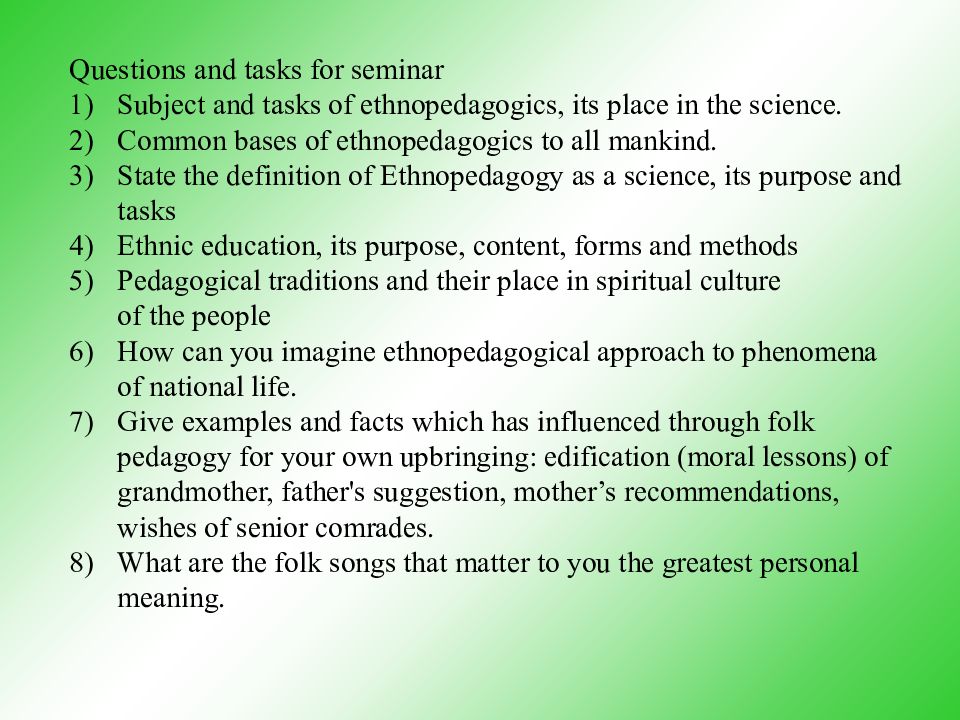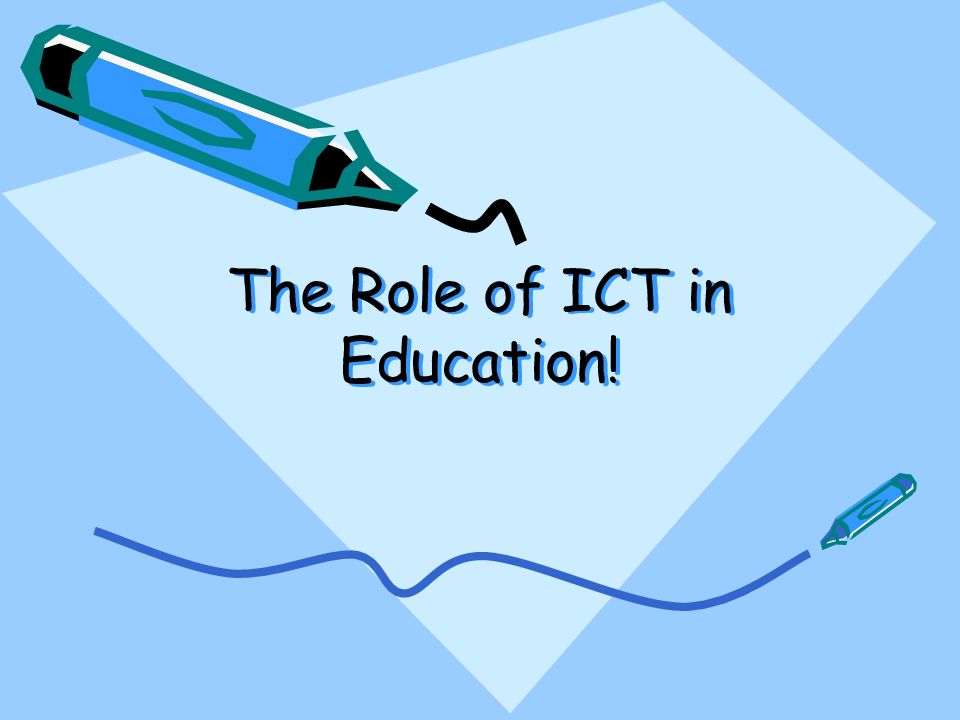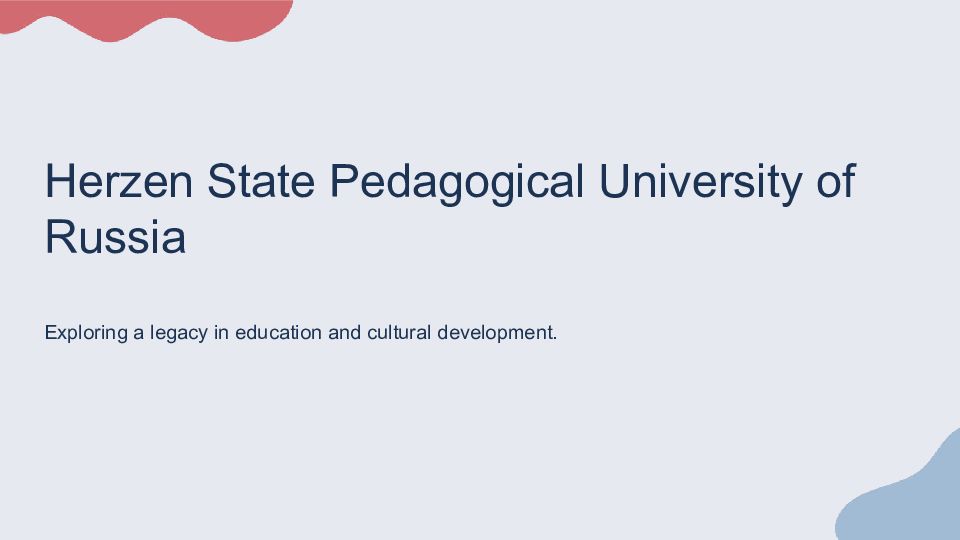Первый слайд презентации
Ethno pedagogy - the science that studies life experience of the people those are the guidance of education, formation and instruction of youth outlooks and this folk pedagogy is traditional practice of education and training of young generation, historically rooted in different ethnic groups. Ethno pedagogy - A Manual (guide, handbook) in Cultural Sensitivity, with Techniques for Improving Cross-Cultural Teaching by Fitting Ethnic Patterns.
Слайд 2
The subject of Ethnopedagogy: Examines the process of social interaction and social influence educates, develops personality, assimilate social norms, values and practices; collects and organizes folk knowledge about education and teaching children and represent as pedagogical potential of influencing in the process of historical and cultural identity formation. Ethno-pedagogy, as defined by Henry Burger, is the “activity of cross-cultural teaching.” The goal of ethno-pedagogy is the attainment of syncretism, or the “reconciliation of two or more cultural systems of elements with the modification ( changes or adapts the material to make it simpler ) of both.” Further, the author refers to cross-cultural teaching as “applied educational ethnology,” maintaining that it can be considered a “subdiscipline” of anthropology (studies of humans, past and present)
Слайд 3
Ethno-pedagogy, as defined by Henry Burger, is the “activity of cross-cultural teaching.” Subject of ethnopedagogics includes the following issues: pedagogy family life, all nations’ proverbs and sayings and their value and their morality to younger generations, riddles as a means of intellectual education, folk songs and their role in the aesthetic education, homemade toys, lullabies (cradle songs) and their role in creativity of children also their pedagogical function and pedagogical community of different cultures and their national identity, etc. The aim of ethnopedagogy is educate, train up a perfect person which must be proceeded in triad of "mind", "kindness", "hard work."
Слайд 4
So, ethnopedagogy studies: - main pedagogical concepts of people (care, education, self-education, re-education, instruction, training, introduction); the child as an object and subject of education (own child, an orphan, adoptee, peers, friends, other people's children, children's environment); function of upbringing (preparation for work, the formation of moral volitional traits (courage), development of mind, health care, fostering love of beauty); factors of education (nature, game, word, communication, tradition, business, life, art, religion, an ideal example of (individual characters); methods of upbringing (conviction, order, clarification, wishes, blessings, oath, request, advice, hints, persuasion, commandment, trust, repentance, ban, curse, abuse, punishment etc) resources of education (nursery rhyme, proverbs, riddles, epics, tales, legends, legends, myths, etc.) organization of education (collective or group works, youth holidays, national holidays).
Слайд 5
Tasks of ethnopedagogy : study of the specifics of folk pedagogy, its background, original development and current status; its place in the life of the people and its role in the development of pedagogical culture of mankind; identify key categories and laws of public education; study of the process of formation of national nature and take it into consideration as a inheritance of the ethnic community; clarify the relations of folk pedagogy with teaching science; analysis of the identity of pedagogical culture of the people The object of research in ethnopedagogics is upbringing process. object of the education is a child
Слайд 6
Functions of ethnopedagogy: to train ambitiousness, viable, healthier and intellectual elite of the country to educate clever, smart, crafty and workaholic person from little age instill humanism and patriotic feeling train spiritually-culturally developed person
Слайд 7
Stages of formation ethnopedagogics as a science Times of tribal ethnic community The adoption of Christianity in XVIII century XVIII to the second half of XX century. – theoretical Theoretical and methodological in 1970
Слайд 8
Ethnopedagogics as a science designed to implement by two greatest commandments - Jana Amos Comenius and Konstantin Dmitrievich Ushinsky The Great Didactic – 1648 (aims and basic principles of education) K. Ushinskiy regarded that folk pedagogy is one of the most important factors, which evolved under the influence of the native pedagogy. He expressed the most important and the most important thing for all of pedagogy: "Folk has its own special characteristic system of education... Only national education is a living organ in the historical process of national development. Folk pedagogy – is not science, but science subject of ethnopedagogics. People without nationality - a body without a soul The ethnopedagogical orientation of education is proved by G.N.Volkov's works who has opened humanistic bases of national pedagogics, has allocated major factors and means of national education.
Слайд 9
The analysis of the pedagogical theory and practice development shows that at all stages of multinational society formation the questions of familiarizing children with national and universal values, education of international relations culture had an important place in works of well-known domestic pedagogues. Outstanding masterminds of the past - K.D.Ushinsky, L.N.Tolstoy, P.F.Kapterev, P.P.Blonsky, S.T.Shatsky and others - invariably specified the necessity of national school development, training of children in a native language, education of the highly moral character. L.N.Tolstoy considered as a basis of morals which should be formed in a childhood, religion. The gold pedagogical fund of our people which have anticipated many modern theories of education, are the ways of education of the perfect person, proposed centuries ago by scientists-Encyclopaedists, sophists of the East, such as Y.Balasaguni, M.Kashkari, К.А.Yassawi, R.Horezmi, S.Sarai, A.Yugnaki. Connections of pedagogical experience of medieval sophists with problems of patriotic, physical, aesthetic, labour education are insufficiently developed. The period of 20th years was intensive enough in respect of pedagogical innovation, introduction of foreign experience in education: a method of projects, use and development of ideas of M.Montessori, including the sphere of preschool education. G.N.Volkov, K.B.Zharikbaev, S.K.Kaliev assumed studying of culture of the native people, first of all a native language; construction of pedagogical process with the account of national traditions.
Последний слайд презентации: Ethno pedagogy - the science that studies life experience of the people those
Questions and tasks for seminar Subject and tasks of ethnopedagogics, its place in the science. Common bases of ethnopedagogics to all mankind. State the definition of Ethnopedagogy as a science, its purpose and tasks Ethnic education, its purpose, content, forms and methods Pedagogical traditions and their place in spiritual culture of the people How can you imagine ethnopedagogical approach to phenomena of national life. Give examples and facts which has influenced through folk pedagogy for your own upbringing: edification (moral lessons) of grandmother, father's suggestion, mother’s recommendations, wishes of senior comrades. What are the folk songs that matter to you the greatest personal meaning.
